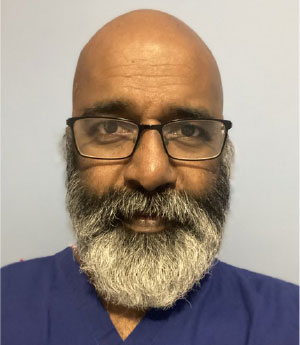Foreword
We’ve long known that the health service is a shining example of diversity, but a poor example of inclusion. Black and minority ethnic (BME) doctors are absolutely indispensable to the medical workforce and set to become increasingly so, with the number of international medical graduates (IMGs) growing by 40% in the last five years alone. But all too often, doctors from black and minority ethnic backgrounds have a poorer experience of medicine than their white colleagues, feeling less supported, less included and less able to prosper.
The case for change is irrefutable. Discrimination and disadvantage are not only morally indefensible, they are also a drag on a doctor’s ability to provide the best possible care for their patients. And they prevent us from making the most of the talented workforce we have, something we can ill afford with service pressures so intense. Thankfully, there is now broad agreement that the status quo is damaging for practitioners and patients alike, and there is great will from all corners of the health service to make things better.
The question is: how?
This report lays out five areas around which energies will be focused. These programmes of work require the commitment and cooperation of all of us who make up the health system. No one organisation holds the solution: it is by working together and combining our efforts that we will shift the dial. All stakeholders, at all levels, have to play their part.
For us at the GMC, this comes down to the day-to-day working experiences of doctors and the care these experiences enable them to provide. Creating cultures where every doctor can thrive requires meaningful, sustained change in a system sometimes resistant to it. It requires us to be accountable, data driven and tenacious. And it requires us to maintain our focus even in moments of deep challenge for the service. We’re in this for the long haul, and know our partners are too.
The prize will not only be better supported doctors providing better care, but also a better rate of retention in a system that has never needed its workforce more. Fostering environments that bring the best out of every doctor is one of the most effective tools we have for keeping them in the system. From providing robust induction training to IMGs when they join UK practice, to helping specialty and associate specialist (SAS) doctors reach their full potential, we, along with our partners, are taking practical steps today to improve the working environment for BME doctors, now and in the future.
The case has been made. What is needed now is action and an unshakable commitment to change.
Introduction
Since its inception, the NHS has relied heavily on the contribution of first-generation immigrant doctors and nurses in the running of its services. Although the number of medical school placements in the UK has increased, the expansion of science and expectations means that the NHS will continue to depend on doctors from overseas to bridge the gap. A career in the health service is also valued by many black and minority ethnic (BME) people of subsequent generations. As such, more than four in ten doctors currently working in the NHS are of BME origin. The first Medical Workforce Race Equality Standard (MWRES) report – published July 2021 – highlighted issues that we need to tackle within the medical workforce.
The five programmes of work outlined in this document are aimed at clearing the stones in the foothills as the first part of that journey. They represent a data-led and evidence-based approach to tackle the inequality faced by BME doctors in the NHS. This document is an iterative one – it has been developed by the Workforce Race Equality Standard (WRES) team in NHS England and strengthened by the collaboration of a wide range of other regulatory partners. As targets are met, this document will be updated to focus on the future steps. But for now, we have a clear vision for what to work on, a fellowship of staunch stakeholders, and the support of many in the workforce.
The debate is about more than equality and opportunity; rather fairness irrespective of one’s ethnicity. Apart from the moral imperative of a workforce being treated equally, there also is the need to improve morale while we face multiple challenges in the NHS. Improve morale for all, irrespective of ethnicity.
What does the future hold? One hopes it shows improvement of the markers as well as a collective willingness from many to make change happen. It is not the policy itself which moves the dial, but the belief from many in the system that this needs to be done and is the right thing to do.
The plan for the year ahead is for the national Workforce Race Equality Standard (WRES) team to support NHS trusts and systems to move on to the next stage of advancing race equality using detailed demographic analysis at individual organisational level.
In that context, the Medical Workforce Race Equality Standard (MWRES) report published in 2021 showed discrepancies and inequalities which need improving as a priority.
The NHS has a responsibility to develop an action plan for all doctors to address the MWRES finding – working with stakeholders including Health Education England (HEE), NHS Employers, NHS Resolution, Academy of Medical Royal Colleges (AoMRC), British Medical Association (BMA) and General Medical Council (GMC).
(The responsibility for doctors in training sits with HEE and they have developed an action plan aligning with HEE’s Quality Framework. NHS England and HEE work together until they formally merge into a single organisation).
The tasks and actions set out in this plan will be delivered in partnership by the organisations which have collaborated in its development. Progress will continue to be measured using WRES data. This plan is aligned to the NHS England Operating Framework and to the forthcoming NHS Equality, Diversity and Inclusion (EDI) Improvement Plan, which will set out accountabilities and responsibilities at national and system level for the delivery of actions to improve equality, diversity and inclusion within the NHS.
MWRES next steps
The publication of the MWRES report in 2021 identified the racial disparity experienced by BME doctors in terms of recruitment, promotion, pay, experience of bullying and harassment, and representation in senior positions. This was especially evident for international medical graduates and specialty and associate specialist (SAS) doctors.
The focus will be on five domains:
- To reduce disproportionality of entry into local disciplinary processes and referrals to the GMC for BME and international medical graduate (IMG) doctors.
- To improve diversity in senior medical leadership appointments.
- To increase BME representation amongst the Councils of Royal Colleges to proportionately reflect their memberships.
- To ensure there are meaningful local arrangements for initial and ongoing support for IMG doctors.
- To support SAS doctors to make progress in leadership roles and by review of the contract.
All the above will need commitment from all stakeholders at all levels including medical directors and directors of HR/OD. The national WRES function will support outcomes monitoring, identification of best practice and engagement with regulatory partners.
Domain 1
Entry into local disciplinary processes and GMC referrals
Aim
To strengthen consistency of decision making and significantly reduce disproportionate entry of BME and IMG doctors into local disciplinary and regulatory processes.
Task(s)
- All partner organisations will establish cross-organisational working to improve the support available to doctors when responding to employers’ concerns
- NHS Resolution to create a checklist to support employers to take a proportionate and fair approach to the preliminary analysis of concerns
- Improve consideration and understanding of culture and inclusion by GMC decision makers when considering employer referrals and fitness to practice concerns
- All partner organisations will signpost provider organisations and practitioners to NHS Resolution to provide impartial advice, to effectively manage and resolve concerns raised about the practice of individual practitioners. This will enable a fair and effective application of local performance management procedures and promote good practice in relation to local case management and investigation
- NHS Resolution to further develop training for designated non-executive directors
(NEDs) who, in Maintaining High Professional Standards (MHPS), should provide an impartial route of support for practitioners at the preliminary analysis or case investigation stages - NHS England will work with NHS Resolution and GMC to develop training for cultural competence in decision making, building on the work of the NHS East of England pilot
- Organisations to take a data-driven approach to identifying and disseminating good practice
- GMC and relevant organisations to collaborate to understand what support and advice is helpful to organisations with low conversion rates of referrals to regulatory action
Domain 2
Encouraging diversity in senior medical leadership appointments
Aim
To encourage greater representation of BME appointments in senior medical positions and to promote inclusive recruitment.
Task
Trust HR teams should review their recruitment strategy in relation to senior medical leadership roles and consider steps which should be taken to improve the diversity of candidates and/or appointees.
Example of a step which might be considered:
Considering whether it is appropriate and legally possible to take positive action under section 159 of the Equality Act 2010 in relation to a particular role, all recruitment and selection panels should follow best practice and have a senior Independent Panel Member (IPM) from an ethnically diverse background. The panel should ideally be constituted in a way that reflects the ethnic diversity of the medical profession. This should be considered at all stages of the process including longlisting, shortlisting and interview. The selection process should consider actively seeking anonymous feedback from ethnic minority applicants who have been through the process, with a built-in feedback mechanism enabling continuous improvement.
Domain 3
Royal College representation
Aim
Improve representation of BME doctors, from all ethnicities, in senior college positions.
Task
Individual Medical Royal Colleges and faculties to provide full data on their memberships as well as the composition of senior positions and their Councils. The Academy of Medical Royal Colleges will help facilitate this collation and support shared learning about how to increase diversity among members, councils, and senior leadership positions. Exemplar colleges with race action plans will be consulted to summarise actions which have proved effective.
Domain 4
Standardise support arrangements for international medical graduates (IMGs)
Aim
IMG colleagues often report poor experiences of induction. Various recent independent reports recommend a comprehensive induction programme to support IMGs and note that their initial experiences in the UK can have ongoing adverse impact.
Task
NHS England and NHS Employers to develop and implement a locally delivered standardised induction for IMGs which includes a welcome, local practical support and orientation, support with the language and workings of the NHS, delivery of care, ethical and cultural differences in UK practice, relevant specialty-specific components and ongoing mentorship.
Domain 5
Parity for SAS doctors
Aim
Better support SAS doctors by understanding their needs, including through supporting research delivered by the GMC. SAS doctors are vital to the UK medical workforce and a large proportion of them are trained outside the UK. These colleagues are more likely to face inequality in terms of appraisal success, disciplinary referral, revalidation as well as bullying, harassment, and discrimination.
Task(s)
- The GMC, statutory education bodies and others will deliver pilot initiatives to improve outcomes for BME and overseas qualified trainees. These initiatives will include, for example, supporting enhanced exam preparation and improved access to reasonable adjustments. We hope that the findings from the pilots will inform future support for SAS doctors looking to pass specialty exams and join the specialist register.
- NHS England and partner organisations will work with trusts and other stakeholders to develop a standardised support offer for SAS doctors in leadership roles, education and research opportunities, as well as appropriate contractual changes as set by NHS Employers.
References
Welcoming and valuing IMGs: the standardised induction guidance
No More Tickboxes
The SAS charter (bma.org.uk)
SAS doctor development guide
Staff, associate specialist and specialty doctor contract (bma.org.uk)
Findings from the equality and diversity survey of Academy committees
Academy of Medical Royal Colleges – SAS doctors
NHS England » A just culture guide
“Why are we still here? The factors still affecting the progression of ethnic minority doctors in the UK”
Creating a just and learning culture
Acknowledgments
Jo Wren, General Medical Council
Tista Chakravarty-Gannon, General Medical Council
Andy Lewis, General Medical Council
Ellie Pattinson, NHS Employers
Vicky Voller, NHS Resolution
Alison Moulds, Academy of Medical Royal Colleges
Aishnine Benjamin, British Medical Association
Chaand Nagpaul, British Medical Association




